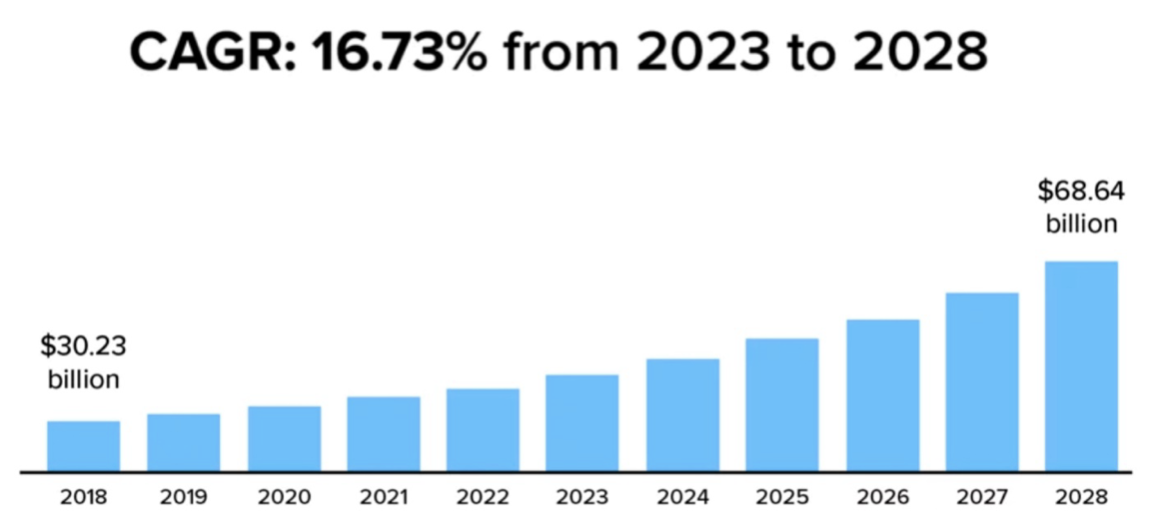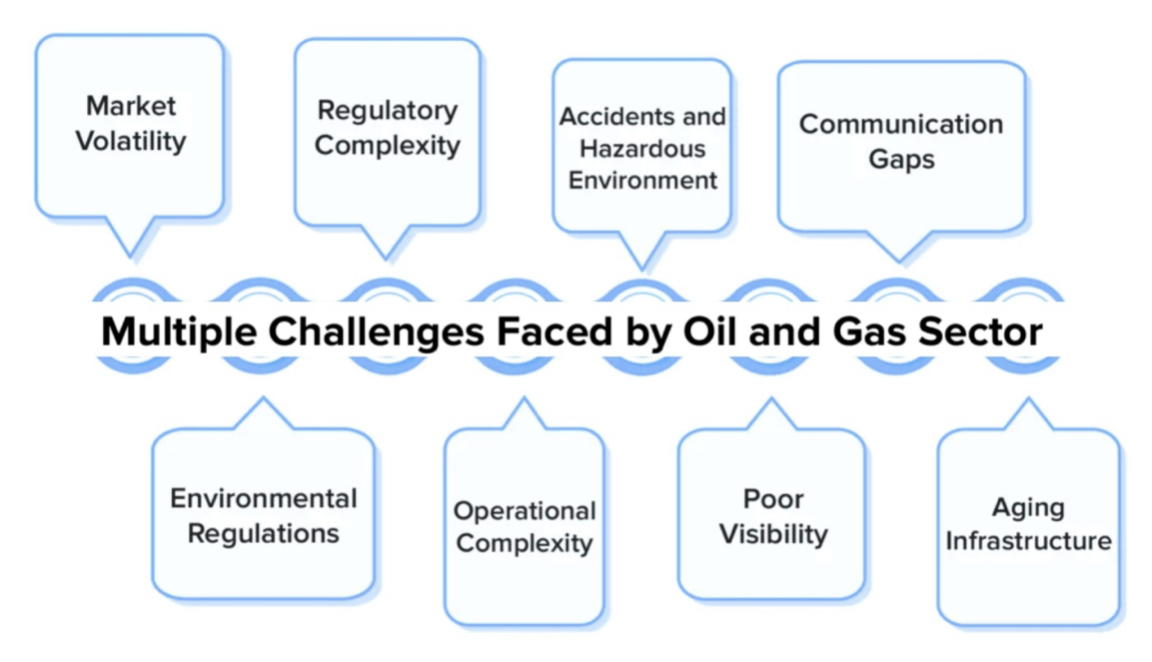For over a century, the oil and gas industry has thrived by extracting crude oil from beneath the earth’s surface, relying on resilience, intuition, and powerful hardware. However, the modern era is witnessing a significant shift toward digitalization.
Digital technologies are rapidly infiltrating the oil and gas landscape, revolutionizing exploration, extraction, and resource management. As we stand on the brink of a notable digital transformation in this sector, industry players are embracing new technologies to enhance operations, improve efficiency, and reduce costs.
Data analytics, artificial intelligence, robotics, and the Internet of Things are transforming the entire oil and gas value chain. This revolution isn’t merely about technology upgrades; it’s about creating value across all business areas.
According to Accenture, 70% of industry leaders recognize that enterprise-wide transformation is crucial for competitiveness. This commitment to reinvention addresses challenges like volatile prices, environmental concerns, and evolving regulations.
In this article, we’ll delve into the role of digital transformation in the oil and gas industry and explore how these technological advancements are reshaping the landscape, particularly in the Middle East. Let’s dive right into the details!
Digital transformation in the oil and gas industry marks a significant evolution in traditional processes, enhancing exploration, production, and operational efficiency through the integration of advanced digital technologies.
Key Aspects of Digital Transformation in Oil and Gas
1. Strategic Integration Across the Value Chain Digital transformation involves embedding cutting-edge technologies at every stage of the oil and gas value chain. This holistic approach ensures that all aspects of the industry benefit from increased efficiency and innovation.
2. Real-Time Monitoring and Data Analytics One primary goal of digitalization is to improve operations using smart sensors and data analytics. Real-time monitoring enables efficient equipment maintenance and optimizes production processes, resulting in substantial cost savings and higher productivity.
3. Automation and Robotics The use of automation and robotics in the oil and gas sector enhances operational efficiency by handling repetitive tasks. This not only increases precision but also allows human experts to focus on strategic decision-making.
4. AI and Predictive Analytics Advanced AI technology analyzes operational data to proactively identify potential hazards, ensuring a safer working environment. Additionally, AI-driven seismic surveys and data analysis improve the accuracy and efficiency of exploration efforts.
Industry Impact and Future Prospects
A survey highlights the benefits of digital technologies in the oil and gas sector, noting that major industry players are leveraging digitization to reduce costs, boost production, and optimize efficiency. These companies are integrating technology-driven operations throughout their business, focusing on enhancing workforce capabilities and upgrading information infrastructure to deliver tangible value.

According to a report, the digital transformation market in the oil and gas industry is projected to reach $68.64 billion by 2028, with a CAGR of 16.73% from 2023 to 2028. This growth is driven by increased investments, the need for improved operational efficiency, and the rising demand for advanced technologies in exploration activities.
Embracing digital transformation services in the oil and gas sector significantly boosts efficiency, ensures proactive safety measures, and drives precision in exploration. As industry leaders adopt digitization, this transformation goes beyond a mere technological upgrade; it represents a commitment to harnessing digital potential for long-term success.
Major Challenges in the Oil and Gas Industry
The oil and gas industry are fraught with numerous challenges, from complex drilling operations to hazardous environments and communication gaps. Let’s delve into these issues in detail:

Key Challenges in the Oil and Gas Sector
Market Volatility
The oil and gas industry are highly susceptible to unpredictable shifts in commodity prices. These fluctuations can significantly impact earnings and financial stability. Consequently, companies need flexible strategies that can quickly adapt to market changes to ensure continued profitability.
Environmental Regulations
Stringent environmental regulations pose both financial and operational challenges for the oil and gas industry. Compliance requires substantial investments in sustainable practices. It is crucial for companies to balance meeting these environmental standards while maintaining cost-effectiveness.
Regulatory Complexity
Adapting to evolving regulations and locational uncertainties complicates strategic planning and long-term investments in the oil and gas sector. Effective management of regulatory changes is essential to maintain compliance and minimize operational risks.
Operational Complexity
Exploration and drilling in the oil and gas industry involve intricate processes requiring precision and the use of heavy machinery. Challenges such as extended drilling periods, potential for inaccurate well placement, equipment downtime, and high exploration costs add to the operational complexities.
Accidents and Hazardous Environments
Downstream sectors face significant risks from accidents involving heavy machinery and health issues from hazardous gas releases. Proper preventive measures can mitigate these risks, which otherwise result in disruptions, worker health complications, environmental pollution, and supply chain impacts.
Lack of Visibility
Facilitating digitalization in the oil and gas industry necessitates clear operational insights for informed decision-making. However, many companies lack comprehensive visibility, especially in refining and transportation, leading to challenges in adhering to work ethics and safety regulations, ultimately affecting efficiency.
Communication Gaps
Persistent communication issues in the oil and gas sector impact interactions with suppliers, vendors, and customers. Limited infrastructure often causes frequent disruptions in communication between managers and field technicians. Integrating advanced monitoring technologies can significantly enhance communication reliability and overall operational efficiency.
Upgrading Aging Infrastructure: A Critical Need for Modernization
Many regions grapple with outdated infrastructure, necessitating significant investments in upgrades and technological advancements. Modernizing these systems is essential to ensure reliability, efficiency, and compliance with evolving industry standards.
The Technological Shift in the Oil and Gas Industry
As the oil and gas sector embraces new technologies, it is undergoing a significant digital transformation. Here’s how these advancements are addressing existing challenges and unlocking new opportunities for efficiency, sustainability, and competitiveness in an evolving energy landscape.
Key Technologies Driving Digital Transformation in Oil and Gas
Data Analytics and Artificial Intelligence
Data analytics and AI are at the forefront of the oil and gas industry’s digital transformation. Advanced analytics tools process vast amounts of data, providing critical insights for more efficient decision-making. AI algorithms predict equipment issues, optimize production, and enhance overall efficiency.
Robotics and Automation
Robotics and automation significantly boost safety and operational efficiency in the oil and gas sector. Drones perform aerial inspections of pipelines and facilities, minimizing the need for manual inspections in hazardous environments. Automated systems handle routine tasks, allowing human resources to focus on strategic responsibilities.
Internet of Things (IoT)
IoT is revolutionizing the oil and gas industry by creating a network of interconnected devices and sensors. These smart sensors enable real-time monitoring, proactive maintenance, and reduced downtime. IoT enhances operational visibility, leading to better decision-making and optimized resource utilization.
Augmented Reality (AR) and Virtual Reality (VR)
AR and VR technologies are transforming training, maintenance, and field operations. Immersive simulations offer realistic training experiences, improving safety and reducing the learning curve. AR overlays provide guidance during maintenance procedures, increasing accuracy and efficiency.
Blockchain Technology
Blockchain technology enhances transactional efficiency, trust, transparency, and security across the oil and gas supply chain. It ensures authenticity and resists fraudulent activities, driving operational efficiency and fostering innovation.
Cloud Computing
Cloud computing revolutionizes collaboration and data sharing in the oil and gas industry by providing seamless access to centralized data repositories. This enhances project management efficiency, enabling real-time collaboration and secure storage of sensitive information.
Edge Computing
Edge computing addresses data processing and latency challenges by bringing computational resources closer to the data source. This enhances operational agility and efficiency, playing a pivotal role in the ongoing technological transformation of the oil and gas industry.
Harnessing the Power of Industrial 5G in Oil and Gas
Industrial 5G technology revolutionizes remote operations and control, drastically reducing the need for on-site physical presence. Operators can now efficiently oversee and manage critical infrastructure like pipelines and drilling equipment from remote locations. This transformation enhances operational efficiency and bolsters safety measures. By leveraging digital technology, Industrial 5G stands as a pivotal advancement in the oil and gas industry, driving forward operational capabilities and innovation.
How O2 Technologies Can Drive Your Digital Transformation in the Oil and Gas Industry
In today’s rapidly advancing oil and gas sector, technological innovation is key to improving efficiency, productivity, and sustainability. Embracing digital transformation through automation, advanced exploration techniques, robotics, and other cutting-edge technologies is now essential for staying competitive.
At O2 Technologies, we specialize in oil and gas development services designed to propel your operations into the future. Our expertise spans IoT, data analytics, blockchain, and AI, ensuring your digital transformation is powered by the most effective and advanced solutions available.
We offer tailored digital solutions that address your specific needs—whether it’s streamlining operations, enhancing safety measures, or optimizing resource management. Our commitment is to keep you at the forefront of technological advancements, making digital transformation a continuous journey rather than a one-time event.
Connect with our experts today to elevate your business operations while upholding the highest standards of integrity and security.
